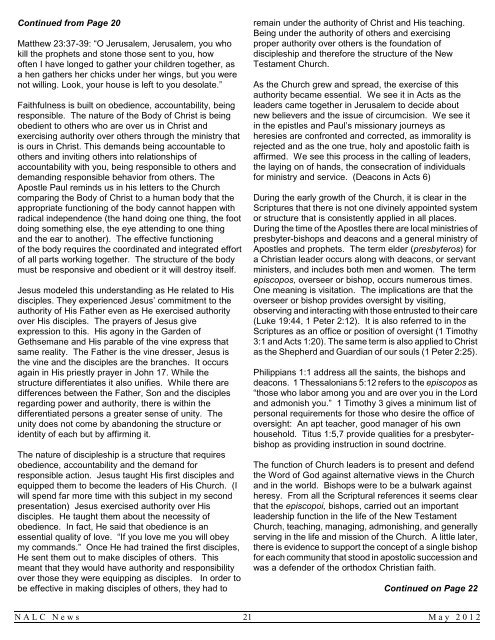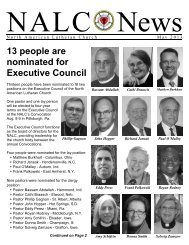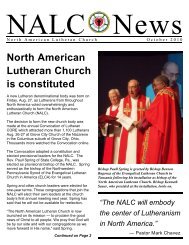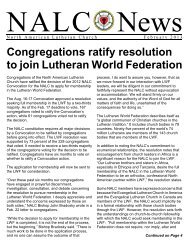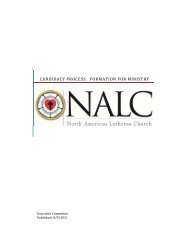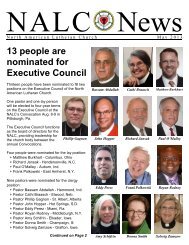May 2012 - North American Lutheran Church
May 2012 - North American Lutheran Church
May 2012 - North American Lutheran Church
Create successful ePaper yourself
Turn your PDF publications into a flip-book with our unique Google optimized e-Paper software.
Continued from Page 20<br />
Matthew 23:37-39: “O Jerusalem, Jerusalem, you who<br />
kill the prophets and stone those sent to you, how<br />
often I have longed to gather your children together, as<br />
a hen gathers her chicks under her wings, but you were<br />
not willing. Look, your house is left to you desolate.”<br />
Faithfulness is built on obedience, accountability, being<br />
responsible. The nature of the Body of Christ is being<br />
obedient to others who are over us in Christ and<br />
exercising authority over others through the ministry that<br />
is ours in Christ. This demands being accountable to<br />
others and inviting others into relationships of<br />
accountability with you, being responsible to others and<br />
demanding responsible behavior from others. The<br />
Apostle Paul reminds us in his letters to the <strong>Church</strong><br />
comparing the Body of Christ to a human body that the<br />
appropriate functioning of the body cannot happen with<br />
radical independence (the hand doing one thing, the foot<br />
doing something else, the eye attending to one thing<br />
and the ear to another). The effective functioning<br />
of the body requires the coordinated and integrated effort<br />
of all parts working together. The structure of the body<br />
must be responsive and obedient or it will destroy itself.<br />
Jesus modeled this understanding as He related to His<br />
disciples. They experienced Jesus’ commitment to the<br />
authority of His Father even as He exercised authority<br />
over His disciples. The prayers of Jesus give<br />
expression to this. His agony in the Garden of<br />
Gethsemane and His parable of the vine express that<br />
same reality. The Father is the vine dresser, Jesus is<br />
the vine and the disciples are the branches. It occurs<br />
again in His priestly prayer in John 17. While the<br />
structure differentiates it also unifies. While there are<br />
differences between the Father, Son and the disciples<br />
regarding power and authority, there is within the<br />
differentiated persons a greater sense of unity. The<br />
unity does not come by abandoning the structure or<br />
identity of each but by affirming it.<br />
The nature of discipleship is a structure that requires<br />
obedience, accountability and the demand for<br />
responsible action. Jesus taught His first disciples and<br />
equipped them to become the leaders of His <strong>Church</strong>. (I<br />
will spend far more time with this subject in my second<br />
presentation) Jesus exercised authority over His<br />
disciples. He taught them about the necessity of<br />
obedience. In fact, He said that obedience is an<br />
essential quality of love. “If you love me you will obey<br />
my commands.” Once He had trained the first disciples,<br />
He sent them out to make disciples of others. This<br />
meant that they would have authority and responsibility<br />
over those they were equipping as disciples. In order to<br />
be effective in making disciples of others, they had to<br />
remain under the authority of Christ and His teaching.<br />
Being under the authority of others and exercising<br />
proper authority over others is the foundation of<br />
discipleship and therefore the structure of the New<br />
Testament <strong>Church</strong>.<br />
As the <strong>Church</strong> grew and spread, the exercise of this<br />
authority became essential. We see it in Acts as the<br />
leaders came together in Jerusalem to decide about<br />
new believers and the issue of circumcision. We see it<br />
in the epistles and Paul’s missionary journeys as<br />
heresies are confronted and corrected, as immorality is<br />
rejected and as the one true, holy and apostolic faith is<br />
affirmed. We see this process in the calling of leaders,<br />
the laying on of hands, the consecration of individuals<br />
for ministry and service. (Deacons in Acts 6)<br />
During the early growth of the <strong>Church</strong>, it is clear in the<br />
Scriptures that there is not one divinely appointed system<br />
or structure that is consistently applied in all places.<br />
During the time of the Apostles there are local ministries of<br />
presbyter-bishops and deacons and a general ministry of<br />
Apostles and prophets. The term elder (presbyteros) for<br />
a Christian leader occurs along with deacons, or servant<br />
ministers, and includes both men and women. The term<br />
episcopos, overseer or bishop, occurs numerous times.<br />
One meaning is visitation. The implications are that the<br />
overseer or bishop provides oversight by visiting,<br />
observing and interacting with those entrusted to their care<br />
(Luke 19:44, 1 Peter 2:12). It is also referred to in the<br />
Scriptures as an office or position of oversight (1 Timothy<br />
3:1 and Acts 1:20). The same term is also applied to Christ<br />
as the Shepherd and Guardian of our souls (1 Peter 2:25).<br />
Philippians 1:1 address all the saints, the bishops and<br />
deacons. 1 Thessalonians 5:12 refers to the episcopos as<br />
“those who labor among you and are over you in the Lord<br />
and admonish you.” 1 Timothy 3 gives a minimum list of<br />
personal requirements for those who desire the office of<br />
oversight: An apt teacher, good manager of his own<br />
household. Titus 1:5,7 provide qualities for a presbyterbishop<br />
as providing instruction in sound doctrine.<br />
The function of <strong>Church</strong> leaders is to present and defend<br />
the Word of God against alternative views in the <strong>Church</strong><br />
and in the world. Bishops were to be a bulwark against<br />
heresy. From all the Scriptural references it seems clear<br />
that the episcopoi, bishops, carried out an important<br />
leadership function in the life of the New Testament<br />
<strong>Church</strong>, teaching, managing, admonishing, and generally<br />
serving in the life and mission of the <strong>Church</strong>. A little later,<br />
there is evidence to support the concept of a single bishop<br />
for each community that stood in apostolic succession and<br />
was a defender of the orthodox Christian faith.<br />
Continued on Page 22<br />
N A L C N e w s 21 M a y 2 0 1 2


